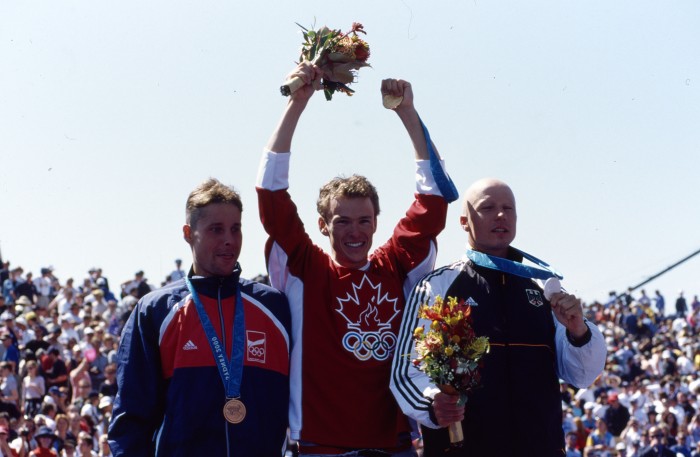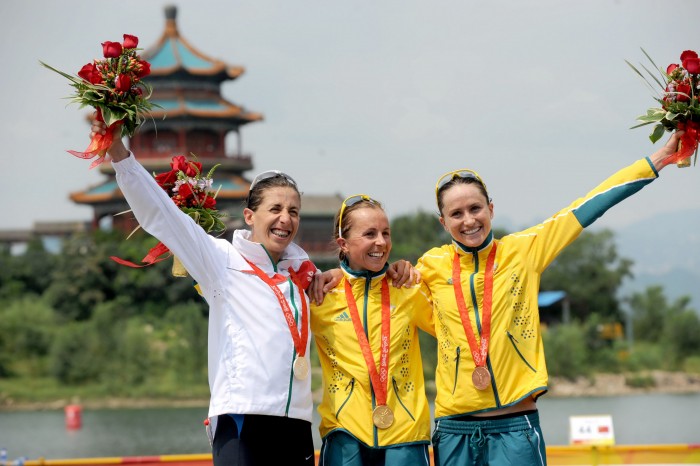Exactly one year from today the best female triathletes in the world will dive into The Serpentine in the battle for Olympic gold. Which means it is the perfect time to revisit triathlon’s history in the Olympic Games, and what will be different about triathlon at London 2012.
OLYMPIC HISTORY
What has happened so far
Triathlon made its official Olympic debut in Sydney, where Simon Whitfield and Brigitte McMahon stamped their names in the history books as the first gold medallists. In Athens, it was Hamish Carter and Kate Allen’s golden turn before Emma Snowsill and Jan Frodeno won the gold in Beijing. Overall, Australia are on top of the Olympic medal tally with a total of four. As well as Snowsill’s gold, Australian women have collected two silver medals, Michellie Jones in Sydney and Loretta Harrop in Athens and one bronze, Emma Moffatt in Beijing. New Zealand and Switzerland have three medals each, each with a gold, then Canada and Germany have two medals. Whitfield has both of those medals for Canada. Austria, Czech Republic and the USA currently have one Olympic medal each. The holder of the most impressive statistic though goes to New Zealand’s Bevan Docherty, who is currently the only triathlete to win an Olympic medal at each Games they have contested. Docherty won silver in Athens and then bronze in Beijing, and could qualify for London this weekend.

FROM BEIJING TO LONDON
Has much changed in triathlon since the last Olympics? You bet it has:
The Dextro Energy Triathlon ITU World Championship Series
Up until Beijing, ITU World Champions were crowned from one race, one day a year. In 2009, that changed dramatically with the introduction of the Dextro Energy Triathlon ITU World Championship Series. Now World Champions are crowned after seven races, six regular rounds and a Grand Final – designed to reward the most consistent triathletes. Alistair Brownlee won the men’s title in 2009 with five wins from five races, Javier Gomez won the title in 2010. In the women’s, Emma Moffatt has won both. Moffatt’s 2010 season perfectly captured the emphasis of the new series, she didn’t win a round, but her consistent podium spots helped her to claim her second consecutive world title. Overall, the world’s best triathletes are competing against each other more often, and the times just keep getting quicker.
Penalty Box
This will be the first Olympic Games with the penalty box for athletes to serve any time penalties. Before, if athletes were given a time penalty during the race the time would simply be taken off their time at the end. Now, athletes must serve their time in the penalty box at some stage during the run. For the complete set of ITU rules and regulations, click here.
Split Schedule
For the first time the triathlon competition at the Olympic Games will be spread over more than two days. The women’s race will be part of a Super Saturday, on August 4, and the men’s race will follow three days later on Tuesday August 7. In the previous three Olympics since the sport debuted in Sydney 2000, the men’s and women’s medals have been on two consecutive days. With no heats or preliminaries, the women’s battle for the medals will start at 9am while the men’s will start slightly later at 11:30am on Tuesday.
What about the Beijing Olympic Champions?
Neither Jan Frodeno or Emma Snowsill have dominated the sport since they each claimed a gold medal in Beijing - but they have both certainly done enough to suggest they will be in London to defend their hold medals. Back in Beijing, Snowsill cemented her status as a triathlon legend with her gold, running the perfect race to hold off rival Vanessa Fernandes and Emma Moffatt. Since then she’s struggled with injury and form, her only series wins were the 2009 season opener in Tongyeong and the 2010 Budapest Grand Final. Although the latest signs are that she’s conquered both problems, she ran her way onto the all-Aussie, all-Emma podium in Hamburg just a few weeks ago. Frodeno flew under the radar in Beijing, in fact, before he ran into Olympic history in 2008 Frodeno hadn’t actually won an ITU event. And in Beijing, most of the attention was focused on 2008 World Champion Javier Gomez. But Frodeno sat back, waited for his chance and took it, relegating two Olympic legends in Whitfield and Dochety to the silver and bronze. Since then Frodeno has won two Dextro Energy Triathlon Series titles (Yokohama and Seoul) and notched several podiums, but hasn’t made it onto the medal table at the end of the year - finishing fourth in 2009 and then falling off in the 2010 Grand Final to finish way out of contention. Let’s not forget that since Beijing, the two gold medallists have become a couple.

The new contenders
There is still a year to go, but going off this year’s results there are two new gold medal favourites, Alistair Brownlee and Paula Findlay. Brownlee did actually compete in Beijing, where he finished 12th and since then he’s won a World Championship, dominated the Dextro Energy Triathlon Series and brought his younger brother Jonathan in tow. Both look like serious gold medal contenders at home in 2012. In the women’s field, the biggest news is Paula Findlay. Findlay was the only woman to win two series races in 2010, and kicked off 2011 with a perfect three from three and a total of five series wins from six races. But don’t forgot who is currently leading the series rankings, Chilean Barbara Riveros Diaz and Javier Gomez. They also deserve to be medal favourites as well.
THE NEXT 365 DAYS
What’s still to be decided in the next year:
Qualification
The qualification process for triathlon works from two sides, the ITU and then each athletes own National Federation and National Olympic Committee (NOC). First, athletes collect ITU Olympic qualification points to secure a place for their country on the start line. With a total of 55 places in the men’s and women’s races, a maximum of eight National Olympic Committees can qualify three places. Other NOC’s can qualify a maximum of two. The next step is for athletes to qualify for their country’s Olympic team based on the criteria set by their National Federations. Both processes continue well into next year, with the make up of the final field selected on ITU qualification criteria and then the athletes nominated by their National Federation, before being selected by their National Olympic Committee. For more on Olympic qualification, click here.

The perfect four from four
Just getting to one Olympic Games is a huge achievement for any athlete. So multiple Olympians deserve to feel pretty special. In the lead in to London, there is a handful of triathletes who are aiming for an amazing fourth consecutive Olympic Games; each edition since triathlon’s inclusion in Sydney. There are only two women to have race in all three: Kiyomi Niwata (JPN) and Anja Dittmer (GER). Both women will race in London this weekend. In the men’s field, there are ten athletes who have raced in each Olympic Games. They are Simon Whitfield (CAN), Ivan Rana (ESP), Hunter Kemper (USA), Reto Hug (SUI), Tim Don (GBR), Andriy Glushchenko (UKR), Csaba Kuttor (HUN), Olivier Marceau (SUI), Juraci Moreira (BRA), Volodymr Polikarpenko (UKR). Whitfield, Rana, Kemper and Don will all race in London. Hug and Moreira are also both still active on the ITU circuit.

